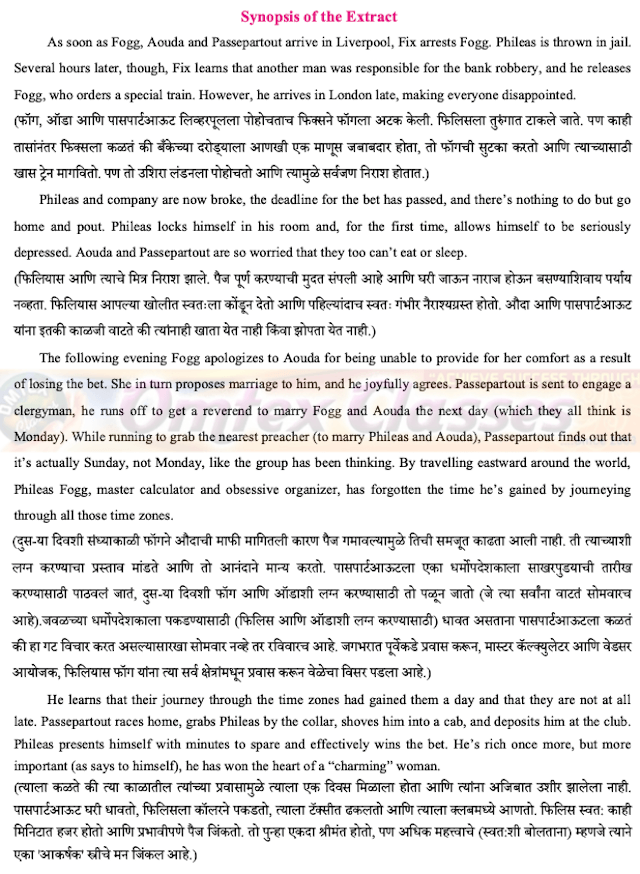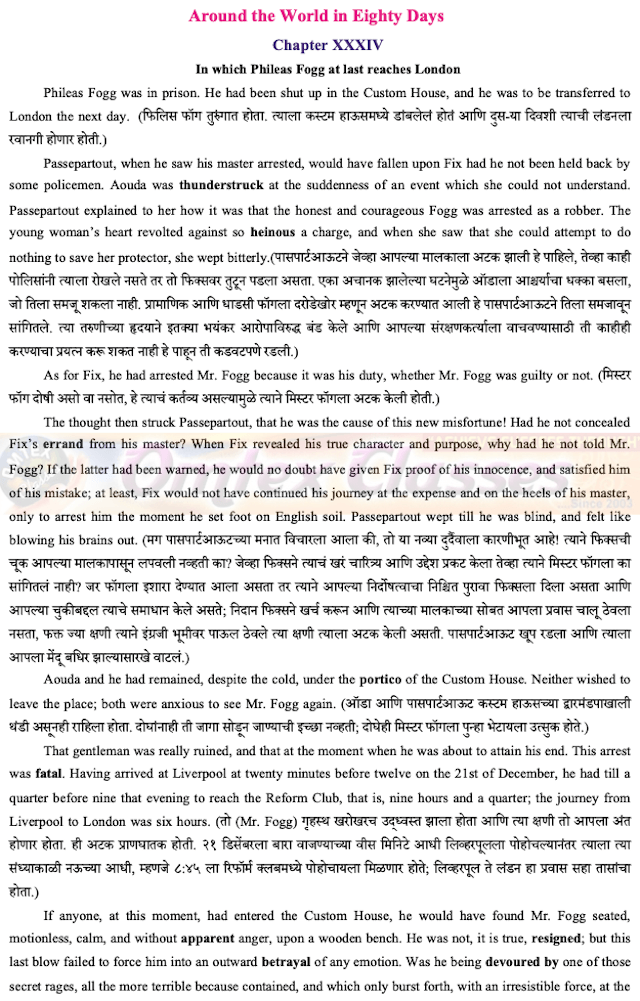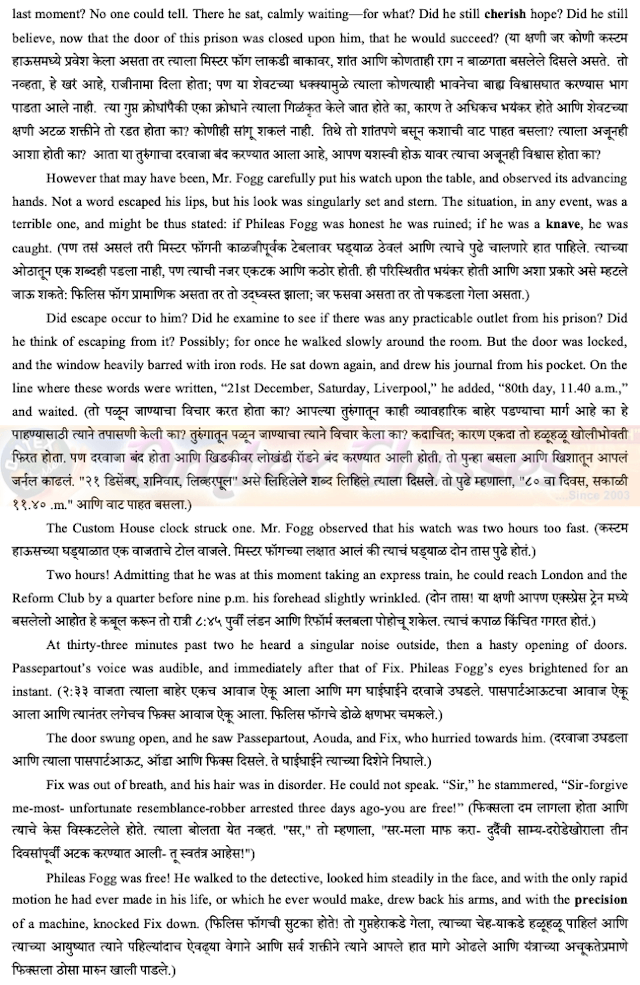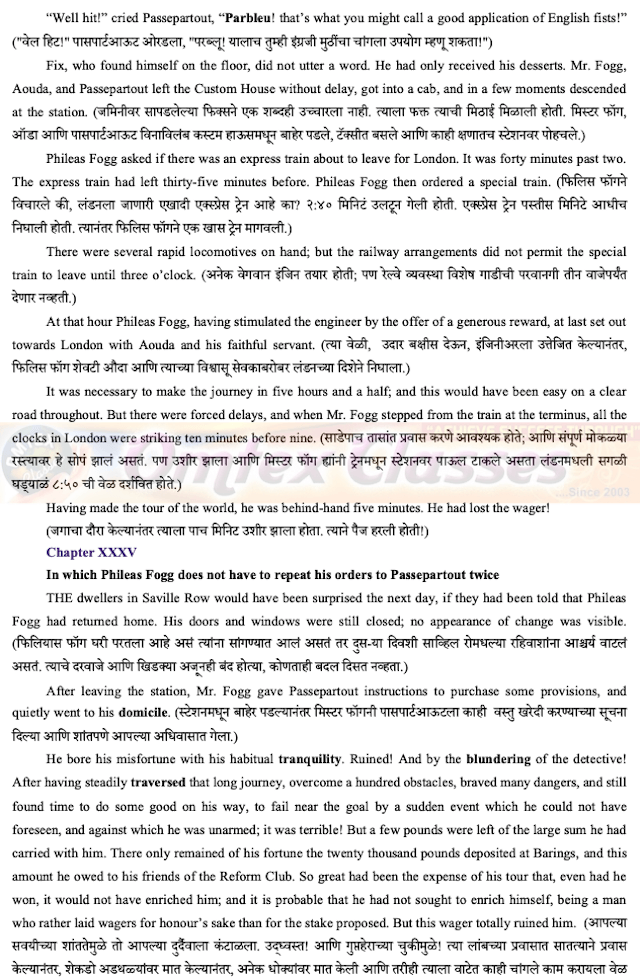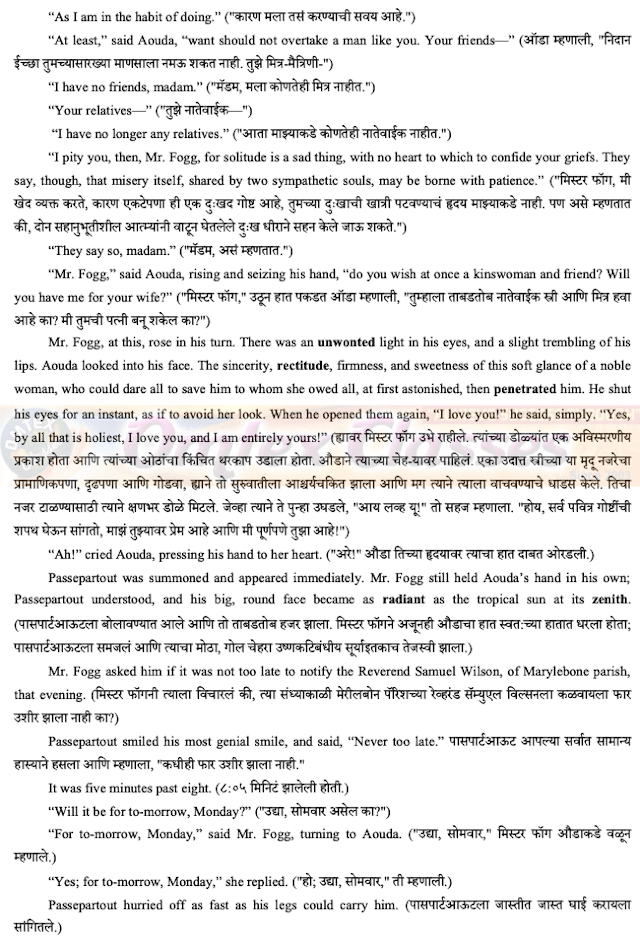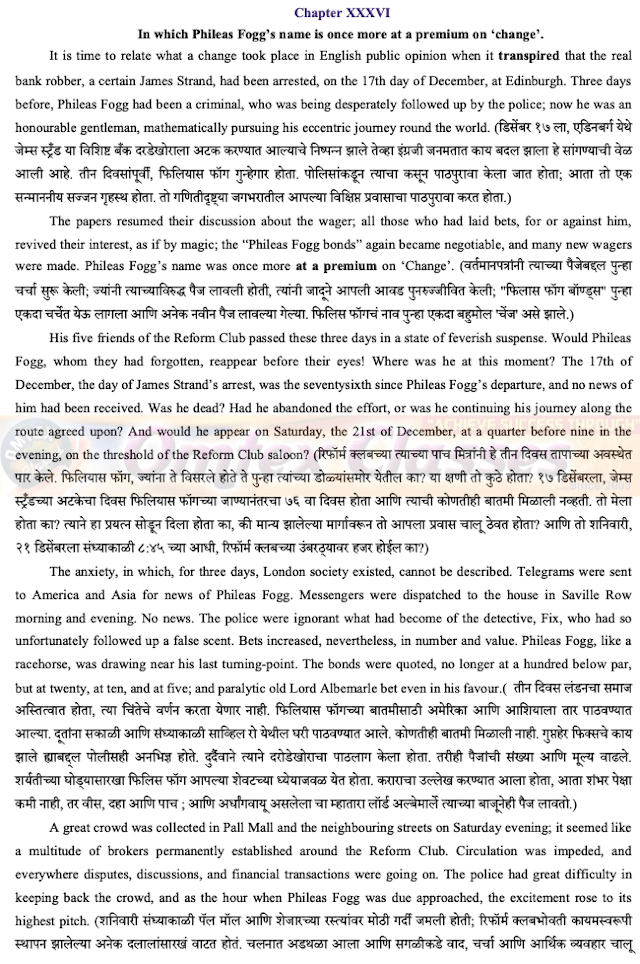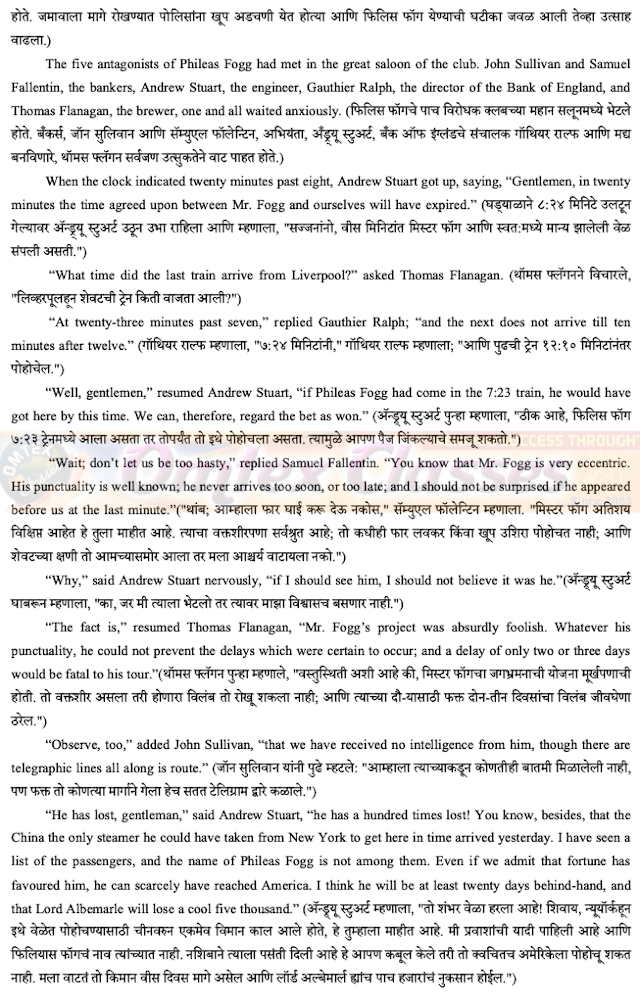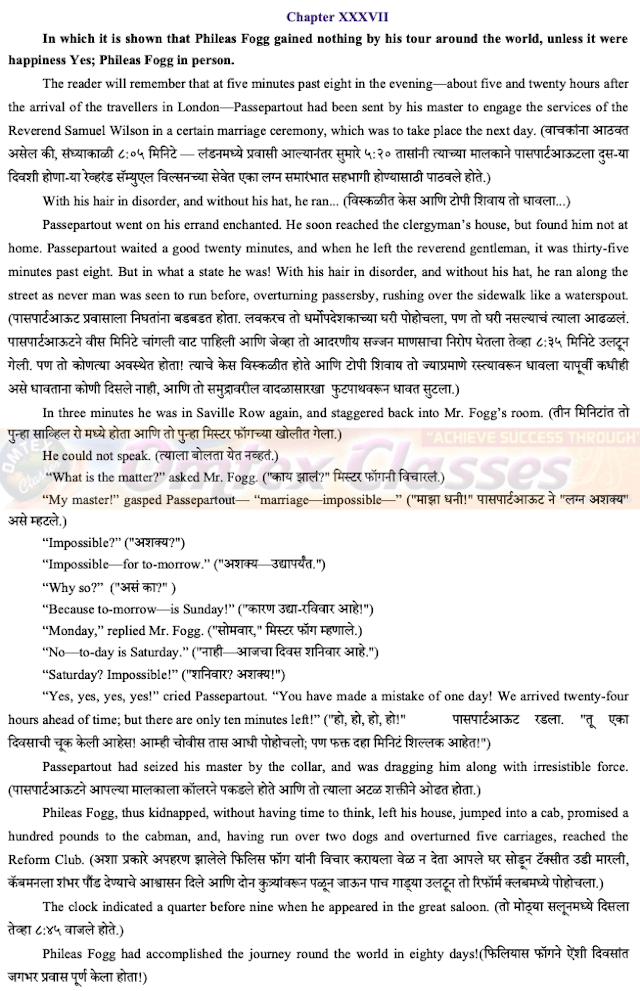4.3 Around the World in Eighty Days
Jules Gabriel Verne:
He was a 19th century French novelist, poet, and playwright. Verne wrote widely popular series of adventure novels including Journey to the Centre of the Earth (1864), Twenty Thousand Leagues Under the Sea (1870), and Around the World in Eighty Days (1873).Verne is generally considered a major literary author in France and most of Europe, Verne has been the second most- translated author in the world.
Characters:
Major Characters:
1) Phileas Fogg –
The hero and chief protagonist in the novel. He is challenged by a fellow gambler to go around the world in eighty days and he takes up the challenge. His rationality, calmness, generosity and self-control appeal to the readers.
2) Passepartout –
He is an employee of Phileas Fogg. He is an honest as well as a comic French man. He is loyal to his master and yet gets into situations that make his master’s plans difficult to travel around the world. Passepartout attracts the reader with his loyalty, warmth and his sense of humour.
3) Detective Fix –
He is the detective. He comes to the wrong conclusion that Fogg is the bank robber and is merely pretending to go around the world when his real purpose is to cheat the law. He tries to capture Fogg.
4) Aouda –
Aouda is a Parsee Indian princess who is orphaned at an early age. She has to marry an old King and when he dies, she has been asked to commit the sacrifice of her life as per the Hindu Tradition of that time. She is rescued by Fogg’s group. She goes back with them to England, as she is unable to find her relative in Hong Kong.
Minor Characters
1) Sir Francis Cromarty:
He is the Brigadier General. He accompanies Fogg from Bombay to Calcutta.
2) John Bunsby:
He is the master of the boat Tankadere, on which Fogg, Fix and Aouda travel. John is a skilled sailor who takes the trio from Hong Kong to Shanghai so that Fogg is able to board the San Francisco boat.
3) The Reform Club Members:
The engineer Andrew Stuart, the banker's John Sullinan & Samuel Fallentin, the brewer Thomas Flanagan and Gauthier Ralph and one of the governors Bank of England are Phileas Fogg’s partners at the Reform club.
4) The Parsee Guide:
A bright looking young Parsee, offers to be the guide on the elephant which will take the travellers to Allahabad. He is a brave and intelligent man and does his job well in conveying the passengers swiftly to Allahabad.
5) Colonel Stamp Proctor:
At San Francisco Fogg, Fix and Aouda find themselves in Montgomery Street, which is crowded by the members of two opposing political parties. The opposing members become violent and Fogg’s group is caught in between. A huge fellow with a red goatee, a ruddy complexion and broad shoulders, raises his fist over Mr. Fogg. Fogg is very angry and later these two men even resort to duelling.
6) Elder William Hitch:
A priest boards the train from San Francisco to New York at Elko Station. He is a Mormon missionary, who gives a lecture on Mormonism in Car no. 117 of the train.
7) Mudge:
An American at Fort Kearney station, offers to transport Fogg and group on a sledge to Omaha station. This skipper of a land craft manages to transfer the group safely to Omaha station in a few hours.
Activities:-
1) Plot:
Arrange the incidents in the correct sequence as per their occurrence in the extract.
a) Aouda accepted Fogg's proposal of marriage.
b) When set free, the first thing that Fogg did was he knocked Fix down.
c) As a part of duty, Fix arrested Fogg.
d) At the fifty-seventh second, Fogg entered the Reform Club Saloon.
Answer:
Correct sequence of the incidents:
c) As a part of duty, Fix arrested Fogg.
b) When set free, the first thing that Fogg did was he knocked Fix down.
d) At the fifty-seventh second, Fogg entered the Reform Club Saloon.
a) Aouda accepted Fogg's proposal of marriage.
2) Plot:
Arrange the incidents in the correct sequence as per their occurrence in the extract.
(a) Fogg knocked detective Fix down.
(b) Passepartout had extinguished the gas burner, which had been burning for eighty days.
(c) Fogg ordered a special train to go to London.
(d) Detective Fix had arrested Fogg
Answer:
Correct sequence of the incidents:
(d) Detective Fix had arrested Fogg
(a) Fogg knocked detective Fix down.
(c) Fogg ordered a special train to go to London.
(b) Passepartout had extinguished the gas burner, which had been burning for eighty days.
3) Plot:
(i) Choose an appropriate reason from the following for Phileas Fogg starting his journey around the world.
(a) Fellow members bet Fogg
(b) Fogg bets his fellow members
(c) Fogg wants to marry Aouda
(d) Fogg committed robbery
(ii) There is a sudden twist in the climax of the novel. Give the line that brings this twist.
Answer:
(i) Appropriate reason for Phileas Fogg starting his journey around the world.
(a) Fellow members bet Fogg
(ii) Line showing a sudden twist in the climax of the novel:
At the fifty-seventh second the door of the saloon opened; and the pendulum had not beat the sixtieth second when Phileas Fogg appeared, followed by an excited crowd who had forced their way through the club doors, and in his calm voice, said, “Here I am, gentlemen!”
.
Chapter 4: Around the World in Eighty Days
Which one among the following is not a major character of the novel? Justify. (Select the correct one)
a. Phileas Fogg
b. Aouda
c. James Strand
d. Jean Passepartout
Solution:
c. James Strand
He is the robber, who had robbed the Bank of England and was arrested three days before Fogg’s mistaken arrest. Though the pursuit of Fogg as “the robber” is one the sub-plots, James is only mentioned in the novel at the time of his arrest. Thus, he is not a major character.
Complete the table highlighting the various traits of the major characters in the extract.
Solution:
Phileas Fogg is as cool as a cucumber whereas Passepartout is as crazy as a loon. Explain the statement by citing some references from the extract.
Solution:
Passepartout’s personality is completely opposite to Fogg’s. While Fogg is serious and meticulous, Passepartout is comical and clumsy. Fogg is worldly, rational, and capable of making informed decisions after carefully studying any situation, while Passepartout is naive, gullible, and tends to get carried away on occasion. This is evident when he is easily manipulated by Fix into hiding Fix’s true motives which result in the arrest of Fogg at Liverpool.
Passepartout is eager, energetic and excited by everything. This is vastly different from Fogg, who always remains calm even under trying circumstances. When Fogg is arrested at Liverpool, he realizes that he may no longer be able to win the bet and is devastated. In spite of having his victory snatched away from him at the last hour, Fogg does not display any anger or sorrow. He is calm and composed. Passepartout, on the other hand, wears his heart on his sleeve at all times. He is so burdened by his guilt of keeping a secret from Fogg that he “wept till he was blind, and felt like blowing his brains out”. When it becomes clear that Fogg has lost the bet, Fogg bears this too, calmly and with restraint. Though he is depressed at having lost everything, he behaves rationally and maturely and begins to think about his next course of action. Passepartout, in contrast, is “tortured by remorse” and even besides his own guilt, is anxious and worried about his master. He urges Fogg to react to the situation with anger, but instead, Fogg chooses to remain calm.
Determined to make his master understand, Passepartout even asks Aouda to talk to him. As Fogg goes about making arrangements calmly, Passepartout is constantly keeping a watch on him because he fears that “something terrible might happen at any moment”. He eventually gets so restless that “finding himself too wretched to remain alone” he knocks at Aouda’s door for company. Thus, Passepartout’s emotional, impulsive, and energetic personality is in definite contrast to Fogg’s calm and contemplative nature.
Detective Fix tried hard but could not fix the charge of robbery on Fogg. Explain the statement from the point of view of Fix.
Solution:
Detective Fix is a tenacious and determined inspector, who suspects Phileas Fogg of robbing the Bank of England. His suspicions are confirmed when a drawing of the robber bears a close resemblance to Fogg. However, Fix cannot arrest Fogg without a warrant. At the same time, he does not want Fogg to get away and thus follows him around the world on his travels, all the while waiting for the warrant to arrive. Even though Fix is sometimes identified as the ‘antagonist’ of the novel, his desire to catch Fogg is not motivated by enmity. Instead, Fix’s motivation is primarily professional. He deems it his duty to catch the robber and bring him to justice. However, it is also true that Fix desires the reward and the fame that awaits the detective who catches the robber. He succeeds in placing numerous obstacles in Fogg’s path and does so without Fogg ever realizing his true motives. Though it is easy for the reader to detest Fix for delaying and disrupting Fogg’s plans, his motive is somewhat justified as Fogg’s innocence is never truly confirmed until the end of the novel and thus, the reader, too remains suspicious of him. Fix is noble in his mission to catch a criminal, but also wavers from his morals when he tries to manipulate Passepartout. He is also focused and resilient as he leaves no stone unturned to achieve his goal. Though bound by duty, he is also objective in his view of Fogg as he begins to admire him through the course of their journey together and even begins to doubt whether or not Fogg is guilty. Even so, he continues to make efforts to arrest Fogg. Eventually, his efforts are rewarded as the warrant arrives in time for him to arrest Fogg at Liverpool. This completely throws off Fogg’s plans and ruins his chances of reaching the Reform Club in time. Though joyous at first, Fix soon realizes he has made a mistake when news of the actual robber being caught reaches him. This discovery leaves him feeling guilty and ashamed as is seen from his speechlessness when he releases Fogg and admits to him that he has made a mistake. When Fogg punches him in anger, Fix does not retaliate but instead accepts the beating as an indication of having deserved it. Thus, even though Fix travels the world in order to catch Fogg, places several obstacles in Fogg’s path, goes against his instincts of believing Fogg’s innocence, manipulates Passepartout and diligently performs his duty, all of which results in Fogg’s arrest, he ultimately fails in fixing the charge of robbery on Fogg.
Describe the character sketch of Aouda from Fogg’s point of view.
Solution:
Aouda is a charming, young woman, rescued from dangerous circumstances by Fogg, who then brought her all the way from India to London, to guarantee her safety. She is adventurous and tough in her decision to journey around the world with Fogg. Aouda seems to be the perfect companion for a man such as Fogg. She is beautiful, sophisticated and kind. Throughout their journey, she is grateful to Fogg for saving her. This gratitude soon turns into love. Fogg’s cold, serious, and secretive nature is no match for Aouda’s love. Slowly, she begins to penetrate his tough exterior and in the end, he is softened by her love. She is, therefore, perceptive, for she recognizes that even though on the surface Fogg seems mechanical and emotionless, he has a kind and gentle heart. She is loyal, for she weeps bitterly when Fogg is arrested and never doubts his integrity. She is caring, for when she sees that he is disappointed and hurt, she asks Passepartout to never leave his side. Moreover, she is just as self-respecting as Fogg himself, for when she finds out that he has lost his fortune, her love for him does not change. She is also equally brave and bold, for she is the one to propose marriage to him. Through Aouda, Fogg learns the most important lesson of all, that of the importance of human connection. Even though the trip around the world earns Fogg nothing, he considers himself to be the “happiest of men” because Aouda’s love has been his greatest reward. Thus, even though he wins the bet, his ultimate victory lies in attaining Aouda’s love.
Arrange the incidents in the correct sequence as per their occurrence in the extract.
a. Aouda accepted Fogg’s proposal of marriage.
b. When set free, the first thing that Fogg did was he knocked Fix down.
c. As a part of duty, Fix arrested, Fogg.
d. At the fifty-seventh second, Fogg entered the Reform Club Saloon.
Solution:
c. As a part of duty, Fix arrested Fogg.
b. When set free, the first thing that Fogg did was he knocked Fix down.
a. Aouda accepted Fogg’s proposal of marriage.
d. At the fifty-seventh second, Fogg entered the Reform Club Saloon.
There is a sudden twist in the climax of the novel. Explain by citing some lines and relevant examples from the extract.
Solution:
When Fogg, Passepartout, and Aouda arrive in London on Saturday, 21st December, at 8:50 p.m., they are five minutes late and Fogg loses the bet. Disappointed and depressed, Fogg retires to his room. The night passes and the next morning (Sunday), Fogg decides to talk to Aouda. He apologizes to Aouda because he has lost his fortune and cannot provide her with a comfortable life. Aouda, in turn, confesses her love for him and they plan to get married the next day (Monday). Until this point, the characters and the readers are under the impression that the bet is lost. However, in the very next chapter, it is revealed that Fogg had arrived just in time to win the bet. The missing explanation is provided in the last chapter, which serves as the climax of the novel. When Passepartout arrives at the Reverend’s house to hire his services for Fogg and Aouda’s marriage for the next day (Monday), he realizes that the next day is not Monday but is in fact, Sunday. He rushes back home to Fogg and conveys this to Fogg in the following line, “Because to-morrow—is Sunday!” Passepartout had quickly concluded that if tomorrow were in fact, Sunday, then today must be Saturday, 21st December. This meant that Fogg could still win the bet because the deadline for the bet is 8:45 p.m. on Saturday, 21st December. This is obviously a shocking turn of events and can be seen in the exciting interaction between Passepartout and Fogg as the truth is revealed in the lines, “You have made a mistake of one day! We arrived twenty-four hours ahead of time, but there are only ten minutes left!”
With only ten minutes left to spare, Passepartout pushes Fogg into a cab and they arrive just in time at the Reform Club and win the bet. What is most surprising about the climax is the error on the part of Fogg, who holds the reputation of being a master calculator and organizer. The narrator asks what the reader is thinking in the lines, “How was it that a man so exact and fastidious could have made this error of a day?” The cause of the error turns to be that Fogg had forgotten about the time he gained as he travelled eastward around the world. The sudden twist is then plainly explained in the line, “Phileas Fogg had, without suspecting it, gained one day on his journey, and this merely because he had travelled constantly eastward;” Thus, the climax offers a sudden turn of events and its shocking nature is apparent in the excited reactions of the main characters as the twist is revealed to them.
Which of the following is an appropriate reason for Phileas Fogg starting his journey around the world?
Fellow members bet Fogg
Fogg bets his fellow members
Fogg wants to marry Aouda
Fogg committed robbery
Solution:
Fellow members bet Fogg
Which of the following are used as a means of transport in the novel? How do they help the character/s in the extract?
a. Elephant
b. Horse
c. Train
d. Steamer
Solution:
All four of the given modes of transport are used by Fogg and his companions at some time or the other during the course of the journey. However, in the given extract, only the train has been used to travel from Liverpool to London. Worried that he might not make it in time to win the bet, Fogg, Passepartout and Aouda arrive at the station to catch the express train to London. However, the express train had already left the station. Desperate to reach London, Fogg then orders a special train and bribes the engineer to set out for London as soon as possible. There is also mention of the Steamer (China) which the men at the Reform Club assume Fogg must have taken to come to Liverpool. However, this journey is not part of the extract and in reality, Fogg had missed the Steamer and ended up finding an alternative way to reach Liverpool.
The beginning of the extract is a scene in the prison at the custom-house. From there the novel moves further from one place/spot to another. Pick and explain all the places/spots where the incident took place.
The most of the part of the setting in the extract is in London. Explain how the setting of the extract is suited to the theme of the novel.
Solution:
The following is an outline of the places/spots mentioned in the extract:
The extract begins in the prison at the custom-house in Liverpool. Fogg has been wrongly imprisoned and the deadline of the bet is drawing near. Fogg’s arrest at Liverpool proves to be the worst blow to his plans. Once released, Fogg and his companions rush to the station to take a train to London. Here, Fogg orders a special train and bribes an engineer to set out for London as soon as possible. This shows Fogg’s desperation to reach London in time. However, they are too late when they arrive in London, Fogg loses the bet and they all retire to Fogg’s house on Savile Row. Fogg’s home is the only place where he allows himself to be truly upset. It is also a sanctuary for Aouda who has been provided with food and shelter. It is here, in Fogg’s home, that Fogg and Aouda confess their love for each other and intend to marry, thereby sending Passepartout to hire a Reverend for the marriage ceremony to be performed the next day. Passepartout’s interaction with the Reverend makes it clear that they have made a mistake in keeping time and that there is still some time left before the deadline. Passepartout then travels back home to Savile Row, quickly convinces Fogg to come along and they rush to the Reform Club where they arrive just in time to win the bet.
Importance of the Setting of London to the Theme of the novel:
The extract is set primarily in 1870s London. This setting is best suited for the novel because the Industrial Revolution in Great Britain led to the development of many modern means of transport. These made world travel a realistic goal and inspired Verne’s story. The novel’s theme of adventure and excitement are both directly related to the use of these marvellous inventions as the main character relies on them to undertake his adventures around the world. Another important aspect of the London setting is the Reform Club of England. The Reform Club symbolizes the refined London society that Fogg and Passepartout must leave behind when they embark on their trip around the world. Thus, it acts as the threshold between ordinary life and the world of adventure. Lastly, the Victorian Era setting of London, England highlights the themes of morality and honour. During this era, the notion of a ‘gentleman’ was considered to be a matter of pride and honour. A ‘gentleman’ was considered to be typically associated with wealth and privilege, but also possessed the values of morality, generosity and proper etiquette. Because of this, it was very important for Fogg to uphold his reputation and was in fact, his primary motivation in making the bet. Even in difficult situations, Fogg does not give up on his morals and behaves honourably, as was expected of an English gentleman.
Describe the importance of the following place in the development of the plot and behaviour of the character.
Liverpool
Solution:
It is the final stop in Fogg’s eighty-day journey before he returns to London. It is of particular importance to Detective Fix because it marks Fogg’s arrival in England, where Fix has the authority to arrest him. This arrest severely delays Fogg’s plans to reach the Reform Club before the deadline and he almost loses the bet.
London
Solution:
It marks the beginning and the ending of Fogg’s eighty-day journey. Towards the end of the novel, reaching London becomes the most important objective for Fogg and when released from prison, he even orders a special train and bribes an engineer just to get to London on time.
Reform Club
Solution:
It acts as the starting point of the plot, since it is the place where the bet is first made. The members of the Reform Club, as with all gentlemen’s clubs of that era, hold the values of honour and morality in high esteem, which leads to Fogg accepting the bet to defend his honour. It is also the place where the bet is finally won and the action of the novel is resolved.
Savile Row
Solution:
It is the street where Fogg lives, located in central London. It is an upscale neighbourhood, indicating that Fogg is a wealthy man. From the point of view of the extract, Savile Row is significant because of two reasons. Not only is it the first place where Fogg truly allows himself to be upset about losing the bet, but it is also the place where Fogg and Aouda declare their love for each other. Both these instances serve as a reminder of Fogg’s transformation from a cold, distant individual at the beginning of the trip, to one softened by the power of human relationships at the end of it.
Edinburgh
Solution:
It is the place where the actual robber of the Bank of England is finally arrested. Because of his arrest, Fogg, who has been wrongfully imprisoned, is finally released and is free to go to London, even as the deadline of the bet draws near. In addition, the actual robber’s arrest clears Fogg’s name in the eyes of the English people and they once again consider him to be a man of honour and even place bets in favour of him successfully completing his extraordinary journey around the world.
Select the correct options:
Which of the following place/s in India is/are not mentioned in the extract of the novel?
a. Bombay (Now, Mumbai)
b. Allahabad
c. Chennai
d. Calcutta (Now, Kolkata)
Solution:
b. Allahabad c. Chennai
Find and explain the significance of various exciting incidents in the extract.
Solution:
The word ‘exciting’ refers to incidents that contribute to the development of action in the extract. There are five such ‘exciting’ incidents in the given extract:
Fogg’s release:
Fix arrests Fogg at Liverpool and severely delays his plans to reach London on time to win the bet. Fogg and the others are devastated. However, several hours later, Fix finally realizes his mistake and releases Fogg. This causes excitement as the tone of the extract changes from one of disappointment to sudden hope as Fogg races to make it to London on time.
Arrival at London:
Fogg, Passepartout, and Aouda finally arrive in London after several delays and obstacles but realize that they are five minutes late and Fogg has lost the bet. This incident is exciting because it changes the tone of the extract from full of hope to sudden disappointment.
Aouda’s proposal:
At Savile Row, Fogg finally allows himself to be depressed and begins to believe that all is lost. Passepartout and Aouda, too, share Fogg’s feelings and an atmosphere of gloom hangs over Savile Row. However, through these moments of sorrow, emerges a glimmer of happiness when Aouda confesses her love to Fogg and he, too, admits that he loves her. Aouda’s proposal and their subsequent decision to marry are extremely significant because they highlight the message of the novel, that of true love and happiness, the idea of which helps Fogg to come out of his state of deep depression. This incident is also exciting because it ultimately leads to the discovery of the true date, thus allowing Fogg to win the bet.
Passepartout’s discovery:
When Passepartout sets out to hire the services of a Reverend for Fogg and Aouda’s marriage, he discovers that the deadline for the bet has not passed. This leads to a complete turn of events, which ultimately results in Fogg winning the bet. Thus, his discovery and its subsequent explanation are a source of great excitement to the reader.
Fogg’s triumph:
In the final moments of the bet, the five members of the Reform Club await Fogg’s arrival. However, they are convinced that they have won the bet and that Fogg will not return on time. At this point, the climax has not been revealed to the reader. The readers and the major characters are under the impression that Fogg has lost the bet. However, Fogg arrives at the club, mere seconds before the deadline, leaving the members of the Club, and more importantly, the readers of the novel, in absolute shock at this turn of events.
Write 4-5 sentences on the ‘Time’ theme of the extract.
Solution:
The most important theme of the novel is the concept of ‘Time’. Through the given extract, the writer tries to convey to the readers that time cannot be controlled or manipulated. When Fogg is arrested at Liverpool, this causes a delay in Fogg’s plans. Throughout his journey, Fogg is depicted as a particular, precise man, who is obsessed with planning for every moment. However, even he could not have predicted his arrest and therefore, could not have prepared for such an event in advance. This shows that no matter how many plans you make, whether time will work for you or against you is uncertain. Consequently, Fogg loses his bet because he is late by five minutes, an example of his defeat at the hands of time. Time also plays a crucial role in the climax of the novel, wherein Fogg wins his bet because he had ‘gained time’ by travelling eastwards on his journey around the world. However, he does not realize this on his own and almost loses the bet. Through sheer coincidence and luck, Fogg becomes aware of the additional ‘day’ that he had gained and wins the bet with just seconds to spare. Thus, the extract ultimately wishes to convey the lesson that no one can control time; it is an uncontrollable, random force and humans are at its mercy.
Write 4-5 sentences on the ‘Morality’ theme of the extract.
Solution:
The extract’s theme of Morality is seen clearly through the actions and behaviour of the honourable Phileas Fogg. Although the bet was made for a winning amount of twenty-thousand pounds, Fogg spends nearly all of his money along the way, proving that reputation, and not money, is his true purpose of placing the bet. Though his arrest by Fix delays his plans severely, Fogg understands that Fix was only doing his duty and soon forgives him. The delay causes him to lose the bet, but even then, Fogg refuses to blame anyone for his misfortune. Even in these trying circumstances, he does not abandon Aouda, but instead makes sure that she has been provided with food and shelter. Finally, when he does win the bet, he divides his earnings between Passepartout and Fix, proving once again, that he is truly a gentleman. The only instance of the extract wherein Fogg’s morals can perhaps be questioned is the bribery of the engineer at the train station. However, on the whole, Fogg displays a keen sense of morality. The theme of morality therefore serves as a reminder, that in the fast-paced excitement of the journey and in difficult situations, it is often easy to forget one’s morals, but Fogg’s actions set an example that others should follow.
Write the central idea of the given extract of the novel, ‘Around the World in Eighty Days’.
Solution:
The given extract focuses on the importance of human connection. Before undertaking a trip around the world, Fogg lived a lonely life. He was detached from society and did not care about what people thought of him. However, by the end of the trip, Fogg realizes the significance of human connection. In Passepartout, he finds a loyal and trustworthy friend and in Aouda, a wonderful and charming partner. Thus, through his many adventures, he gains an understanding and appreciation of interpersonal relationships, which he never had before and considers this to be his greatest reward from the trip. The ending of the novel is unexpected and leads to a sudden twist of events, which result in Fogg winning the bet. However, Fogg realizes that the long and dangerous journey that he has undertaken has been worthwhile, not because he won the bet, but because it led him to Aouda. Thus, through the ending, the author tries to convey to the reader that life holds more meaning than mere worldly desires and that sometimes, the prize is the relationships we form with people.
Justice is served/done in the end. Explain.
Solution:
The journey undertaken by Fogg and Passepartout, when they set out to circumnavigate the world in eighty days, is filled with dangerous obstacles and impossibly difficult situations. However, with Fogg’s determination and wit, and Passepartout’s clever ways, they manage to overcome the numerous challenges before them and still find time to do good for others. In addition, even under trying circumstances, Fogg does not compromise on his morals, proving time and again that he is truly a gentleman. While on their journey, Fogg rescues Aouda from a terrible fate in India and brings her along with him to England. They brave many dangers together and steadily inch closer to their goal till they finally arrive at Liverpool, which is their final stop before London. It is the last day of the bet and they have arrived in Liverpool just on time. Just when Fogg begins to believe that his hard work and labour will soon be paid off, he is arrested by Detective Fix, delivering a severe blow to Fogg’s plans of reaching London on time. This arrest is particularly cruel, because not only is Fogg not the actual robber, but also because Fogg was so close to reaching his goal. Even though Fix eventually realizes his mistake and releases Fogg, they miss the deadline and Fogg loses the bet. At this point, one feels sympathetic towards Fogg because he is an honest, kind and honourable man, who worked so hard and came so far in this epic journey; but in the end it all went to waste and for no fault of his own. However, through a series of events involving coincidence and sheer luck, Fogg realizes that the deadline has not passed and he reaches the Reform Club just in time to win the bet. Thus, the novel ends with Fogg being rewarded for his efforts. He not only wins the bet and defends his honour, but also earns the love of a charming woman, Aouda. Hence, one can say that justice was served in the end, because Fogg’s win was truly well-deserved.
Elaborate the following quote in the light of the extract of the novel, ‘Around the World in Eighty Days’.
‘Quitters never win and winners never quit’
Solution:
Hardships are a part and parcel of life. Those, who give up too easily when things get tough, can never achieve their goals. On the other hand, those who continue to strive hard, without being bogged down by difficult situations, are always successful. Fogg’s objective of completing a trip around the world in eighty days is a highly ambitious one. The journey is long, arduous, and full of dangerous situations and seemingly insurmountable obstacles. However, no matter what comes his way, Fogg does not give up; instead, he continues to believe in himself, keeps working towards his goal, and eventually wins the bet. Thus, the message conveyed by the quote is to not be discouraged by difficult situations; because those who quit can never attain their goals, while those who are determined and keep working will always succeed in the end.
Elaborate the following quote in the light of the extract of the novel, ‘Around the World in Eighty Days’.
‘Time is the only solution to problems’
Solution:
Sometimes, we come across certain problems in our lives which we are unable to solve, no matter how much we try. Such problems can only be resolved if we stop trying to control the situation and leave it up to time (fate). Fogg is a meticulous person, who painfully plans every moment of his life. He believes he has prepared for every possibility as he journeys around the world. However, his arrest at Liverpool leaves him helpless. His plans are severely delayed and he cannot do anything to control this unpredictable turn of events. Once he stops trying to control the situation and accepts it for what it is, things begin to change. Through sheer coincidence and luck, he ends up winning the bet, proving that some problems are best left to the hands of time.
Following are some dialogues of the major characters in the extract. Find out who the speaker is, his/her tone, style, significance, etc., of the dialogue.
Solution:



